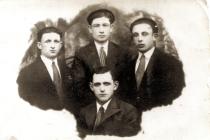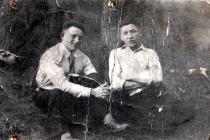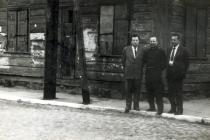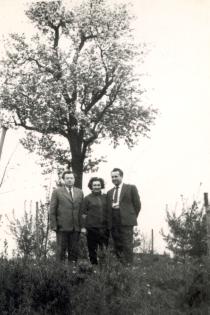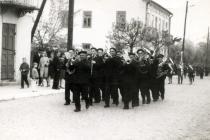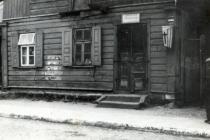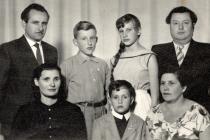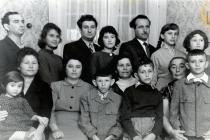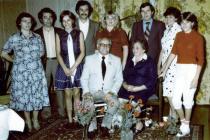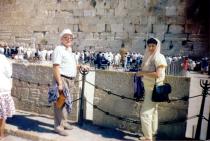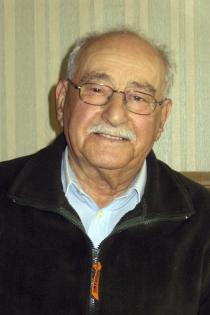
Jankiel Kulawiec
Legnica
Poland
Interviewer: Jakub Rajchman
Date of interview: September 2004
Jankiel Kulawiec comes from Losice, a little town about one hundred kilometers east of Warsaw. Right up until the war Mr. Kulawiec never left his hometown. During our conversation he tells the very interesting story of the life of a poor artisan family in a typical Jewish shtetl. Mr. Kulawiec is a quiet man, gifted with a great sense of humor. We met three times in his apartment in the old part of Legnica, where he shared his passion to the history of his town and its people.
Family background
Growing up
During the War
After the War
Glossary:
My name is Jankiel Kulawiec. I was born in the town of Losice [about 500 km north-east of Legnica], in the pre-war province of Lublin, district of Siedlce, in 1923. I'm recorded under 6th November, but that's not the real date; I was born somewhere around the end of February, beginning of March. It was all because when I fled from Losice during the war I didn't have my birth certificate with me. And after the war, when I wanted to get a duplicate done, it turned out that all the documents from the Jewish community in Losice had been destroyed. And I hadn't been registered anywhere else, only in the Department of Education because I'd been to a Polish elementary school. And there they'd got the dates muddled up, which is why I'm recorded in November. But I remember how my Grandma always used to tell me that I was born six weeks before Easter. [Editor's note: after this calculation Mr. Kulawiec should be born 6 weeks before Pesach, but in the interview he uses the Polish term 'Wielkanoc,' meaning Easter.] So I calculated that it was somewhere around the end of February or beginning of March.
My father was a cobbler, he was called Mojsze - they used to hail him Moszko. Mama was called Roza, nee Mokobocka. We lived in Losice on Kosciuszki Street, in one room, my parents and six children - me and my five siblings, my brothers Josel, Szymon and Icchak, and my sisters Chaja and Fajga.
My father's family was from Losice too. In fact there were lots of Kulawieces in Losice. Granddad Kulawiec had a brother who had several children, and they all lived in Losice, not far from each other. I hardly remember that family at all, because it was only my parents that were in touch with them; I didn't go round there. But I remember my granddad well. His name was Icchak and he was a devout Jew. He was about 60-something years old, at the time I remember him, but he looked like this little old man about 100 years old! He had this huge beard down to his waist, he had sidelocks and wore a head covering - this cap with a small round peak; it was called a 'Krymka' [Crimean cap], from the Crimean Jews, who used to wear caps like that. Granddad was in the cobbler business too; I remember that he worked until his death - they didn't give out pensions back then!
Granddad and Grandma lived on the same street as us, except we lived at no. 4 and they lived at no. 1. They lived with their son, my dad's youngest brother Dawid. My grandparents were religious; we used to go round to their house on all the holidays while they were still alive. Granddad went to synagogue every week too, and he packed me off to cheder when I turned six. I don't remember much more, because they died when I was eight or nine.
My father had two brothers and a sister. The youngest was Dawid, who my grandparents lived with. He was the most resourceful of them. It was him who took over the cobbler's workshop after Granddad. He had his regular customers, from two or three villages, I think; he knocked up shoes for them and they supplied him with food and other things. Besides shoemaking he also rented out orchards. This was how it worked: he would buy the fruit while it was still on the trees, unripe, and all sorts - apples, pears - and all the time they were ripening him and his family would look after them. And then he would pick them and store them. He had these special rooms, stores, that were suited for storing fruit, and later on he would sell the fruit right through to the next season. I remember he bought the fruit from these orchard owners in this village called Picice, near Losice. I used to go there sometimes to check up on the fruit.
Father's other brother was called Jankiel. He was very sick; he had consumption [pulmonary tuberculosis]. The Germans had taken him for forced labor during World War I, and it was while doing that forced labor that he fell ill. And he was sick for a very long time. I remember he used to come to see Dawid, because Dawid was the wealthiest of all of them, so they'd feed him up on eggs and other things. But then he died, that was in the 1930s, I don't remember exactly when. And he left behind a wife, Chana, and six children: Szymon, Natan, Silka, Bluma, Griszka and Szlomka.
Unfortunately I don't know what Father's sister was called. I didn't know her at all. She lived in Warsaw. I don't know how she ended up there or what she did. All I know is that she got married and had a son - he was called Jankiel too. Then her husband died, and Dawid took the son in and brought him up. That's how I remember him - I've even got a photograph of him. And his mother married again, and had another son and a daughter. I don't remember their names. The daughter was ill, I think she had consumption too; she even came to Losice once, and stayed with Dawid, at Grandma's. And then she died, and the other son - her brother - went to Israel, apparently.
I had one more distant cousin on Dad's side - Dowa Ajzenberg. Later on, after the war, I think, she changed her name to Dora. I have no idea why she changed her name. Her mother and my father's mother were sisters. I can't remember what my grandma's maiden name was - Nachtigan or something like that, I think.
Father was my height. Unfortunately I don't have any photographs, but I remember that he was born in 1897. He was hardly religious at all. He didn't work on Saturdays [Sabbath], but he didn't go to synagogue either. I don't even think he went to synagogue on Yom Kippur. He was into politics a bit - on the side of the left-wing parties. He wasn't a particular activist, but he belonged. I just can't remember if it was to the Bund 1 or one of the other left-wing parties. He definitely didn't belong to any of the Zionist parties; if it wasn't to the Bund then I think it was to the Communists, but they were illegal at the time [see Polish Workers' Party] 2.
From what I remember of Father telling us, he met my mama in Warsaw when he went there to look for work. I don't know exactly when that was, but Mama used to go to Warsaw too - to work too, so that must have been how it was.
Mama's family probably came from Sokolow Podlaski [about 30 km north-west of Losice, this town has been noted as a center of Hasidism]. I never went there, and I never met either my grandfather or grandmother on Mama's side, but I remember that Mama used to go there. Mama's surname was Mokobocka - untypical [for Jews], but I think it was a Polonized surname 3. There were two brothers from her family - the Mokobockis - living in Losice: Ilja and Mordko, or Mordechaj. Ilja I remember well. He had a cobbler's workshop on 11 Listopada Street and lived there. He made shoes, and his wife - I don't remember her name - sold something or other on the market square; terrible poverty they were in. I remember too, that Uncle Ilja was a nice guy. He was a lefty as well, not very religious, but he knew the history of the Jews, knew the prayers, could read the Torah and argue with the rabbi. I think he'd got that from home. Later on he was paralyzed and his sons took over the workshop.
Mama was a very pretty, very sociable woman. She sang very nicely, like the rest of her family, in fact - they were all musical. They would often get together and sing - mostly prayers and religious songs. Her brother Ilja, although he was an atheist, was a member of the synagogue choir and he didn't mind singing those songs with Mama and other women. Mama didn't wear a wig; I remember seeing her washing her hair.
I remember that she earned some money on the side to help Father support us. She used to go and do the washing for rich Jews. She was a good cook, she was good at preparing food, and she would often be taken on to help with weddings, and not just in Losice. She even went to Warsaw [about 100 km from Losice], working there as a cook. And it was there, she told us, that she met Father. I don't know exactly how it was, she never said that.
Our house was very small. It was just one room. Across the width of the room there was space for two beds. I remember they were these old, wooden beds. Father had this little workbench between them where he made shoes. And at night Father would put his workbench away and in its place we'd slot this little foldaway - a little metal folding bed - and there was this one bench, and we all slept there. And by the door, on the left as you went in, was the stove. The lavatory was in the yard, and the only window looked out on the lavatory.
On the whole, our family, apart from Granddad and Grandma on Father's side, wasn't very religious. The Jewish traditions were kept up, but no attention was paid to detail. The food at my grandparents' was always kosher, but at our house it wasn't always. I remember there was a fuss once because someone told the rabbi that my father bought hind cuts of meat [not kosher]. And that cost about a third of what kosher meat cost. I don't remember how it ended, but I know that somebody informed on my father to the rabbi.
As long as Granddad was alive we spent all the religious holidays at his house. All the bar mitzvahs were held there too, and circumcision of the babies [brit milah]. There was a rabbi present, too, and at circumcisions there had to be a mohel, who had permission from the rabbi do perform circumcisions. It was a small town and they took money for it; nothing was for free. I don't really remember my own bar mitzvah; I think it was in the synagogue first, and then a celebration at home.
For Sabbath Mama always made chulent. She was a chulent specialist! But I think I liked fish best. We always took the chulent to the bakery on Friday, after they'd finished baking. The baker still had the oven hot then, you see. You put it in the oven, and then on Saturday I, as the oldest, had the duty of going for the pot. My parents didn't work, so there was a bit of free time then. We tidied up then, so that it was clean. Sometimes we'd go for a walk, to different places. There was this wood, Siedlce Wood - about 3 or 4 kilometers from the town, we went to that wood often. And there was a river too - the Toczna it was called. A very narrow river, almost a ditch. But there were places where it was wider. By the watermill, for instance, the water built up there, and during the week we used to go there with our friends to swim.
We observed the holidays traditionally - at Pesach, for instance, the table was covered, and there was matzah. We didn't recite any prayers, but there were candles lit. Even afterwards, when Granddad died, I remember that we made sure not to eat bread at Pesach. But I remember that we baked three poods of matzah for the whole family. A pood was 16 kilos, I think [Russian pound, 1 pound=16.38 kg]. And there were what were called 'shuvalnias,' which were places where matzah was baked officially [kosher matzah bakery, a locally used word], and other places where it was baked, which the Jews called a 'zborne.' In these 'zbornes' [neighborhood matzah bakeries, a locally used word] the Jews baked matzah together; neighbors helped each other. And at the Mokobockis' there was this old stove, and when the time came to bake the matzah, my aunt koshered the stove, the rabbi came to check that it had been properly koshered, and then there was one of those 'zbornes' there. And the poorer Jews helped each other and baked matzah together.
Of the other holidays, I remember Purim, because I always made a bit of money. You see, that's a holiday where people give each other various presents [sending food to friends - mishloach manot, giving gifts to the poor - matanot la'evyonim]. And we - some of the unorthodox, left-wing young people - would play tricks. We'd stuff a pot full of all types of trash, for instance rotten potatoes or something like that, and pack it up nicely. And I was the purimshpiler, the one who dressed up. [Traditionally at Purim parodies (Purim Shpil, Yiddish for Purim Play) are performed. The strolling actors (Purimshpiler) who entertain are rewarded with gifts and refreshments.] I would make myself a mask out of cardboard, take this long shirt from my father, and go round the houses. And people used to play tricks, using people in disguise, like me, to give presents like that. And the people who received them would always give you a grosz [change of zloty] or two. So it all added up.
At Tisze Bow [Tisha be-Av], that's another happy holiday [Editor's note: Tisha be-Av is mainly a day of mourning with a 25-hour fast. The interviewee is most likely mistaking it for another holiday.], as children we would chase around, and pick this kind of fruit, it grew on bushes, looked like little brushes, little balls - I never saw it growing anywhere after the war. We used to throw it in the girls' hair; once it got tangled in it, it was hard to get it out. That kind of game we played.
Yom Kippur, on the other hand, was a serious holiday. We didn't tend to observe the fast. But I remember that people who had quarreled with each other apologized. We had this one quarrelsome neighbor, I remember that at Yom Kippur she would always come round to Mama and apologize. And afterwards the quarrels started again ...
When I was six my granddad took me to cheder. I remember that the rebe guy - the teacher - [melamed] was a tall, red-haired Jew, with this red beard, terribly nasty. The lessons were held in his house; he lived upstairs, I think, in this two-story wooden house. He had a long wooden table and he sat by a window that faced east. And on both sides of him in a row, were the kids. There were over a dozen of us there, all boys. [Editor's note: girls were typically educated at home by the mother or by a melamed, or (after the 1920s) in schools, but separately from boys.]
We mostly learned to pray. And on the corner of the table hung the whip, this leather whip with a dozen or so leather thongs. And he would talk, and if he didn't like something, then smack! Over your hands. 'You're to hold your pencil like this, not like that! You're to turn your piece of paper over like this, not like that! You're to read like this!' And so on. Incredible discipline. And I didn't like it.
I was a fairly lively lad. I remember he had a small field, and he put us to work picking cabbages. And I had it in me to tell him that I'd come to learn, and not to pick cabbages! I was six years old, but I'd already heard that type of left-wing talk at home from my parents. I was already that bright! And he says to me that I'd remember it. And when it was time to go home, he let all the others go and kept me behind. Pulled my trousers down and beat me so badly with that whip that I could hardly get home. When Mama saw it, she asked what had happened. And when I told her, Father went to the teacher and read him the Riot Act. From that time on I didn't go to cheder.
Later on, when I was seven, I went to the Polish elementary school. There, I remember, I liked geography most. I was good at drawing maps and liked studying that. And the worst thing was math. To this day I have one ear that was torn by one of the teachers, who was called Bojko. Later it turned out that during the war that Bojko collaborated with the Germans. But at the time I didn't notice any anti-Semitic behavior from him. And at school among the children we tended to co-exist in peace; we played football together and so on. Only at our desks did we sit separately, Jews and Poles separately, I remember that.
In the 1st and 2nd and 3rd grades I don't remember, perhaps we did sit together, but in the higher grades Jewish and Polish children definitely didn't sit together. There were four rows of desks, and the two on the left were for Jewish children - boys and girls separately - and the two on the right for non-Jewish children. I don't know whether somebody ordered it to be like that, or if it was initiated by children - that's just the way it was. It didn't stop us being friends with the Polish children. I had a friend, Kazik Przykulski, we were in the same class. So during lessons we sat apart but after school we walked home together.
My sisters and brothers went to the same elementary school. I was the eldest. And my youngest sister, Fajga, I looked after her like a nanny. When Mama went out to work, you see, to earn a bit extra to keep the family - she did washing or something else - someone had to look after the children. So I did it.
I had to start work while I was still at school. At that time I earned money once a year baking matzah, in the Mokobockis' 'zborne.' I was what was called 'polewacz wody' ['the water pourer' in Polish]. I poured it into the dough, because while one person mixes, another has to add the water. And the dough was mixed in these brass bowls which after a few rounds of kneading had to be koshered with red-hot stones. Well, and apart from that you had to prepare and bring every pail of water. So I would race around with this water-carrying contraption for two pails, and brought the water from the well. Because there weren't any water pipes, and the nearest wells were about a kilometer from the place where the matzah was baked. And outside the Pesach season, I used to bring water for our neighbors as well, or chop wood for the fire. All I earned I gave to Mama so that there would be enough for food.
When I was in the 5th grade, because of the increasing financial problems at home, I had to quit school and go out to work permanently. As Dad was a cobbler and I already had the foundations of that trade, I went as a cobbler's apprentice to a master. He was called Ajzik Szwajc, and I remember that I earned 3 zloty a week with him at that time. It was a very small amount - you could get a goose for around 2 zloty. And a cobbler could earn even twice as much daily. The workshop was in his house. I remember he was a respected cobbler, and some of my uncle Dawid's employees worked for him too. And Mama kept her hand on my wages. When I wanted to go to the cinema once in a while - and that cost 25 groszy then, I think - I had to deserve it for her to give it to me.
At home we spoke only Yiddish. But at school I learned to read and write in Polish, and my cousin Dowa taught me to read and write in Yiddish. Though how she knew, that I don't know. She was in some left-wing organization, only I don't know whether it was the Bund, perhaps, or the communists that she belonged to. In any case she would come round to our house, a few of us boys would get together, and she taught us. That's how I know how to read and write in Yiddish. A
Later on I read a lot. Mostly these pamphlets - the 'one-groszy library.' These were simple booklets of a few pages, very cheap, written in Yiddish by various Jewish writers and journalists. That was a summary of the most important world events, political matters and others. Even when the Titanic sank they wrote about that, and the thoughts of various communist leaders, that kind of thing. And that was the 'Groszen Bibliotek' for a grosz! This thin pamphlet.
I went to that Hashomer Hatzair 4 too. I went there just like that, because I had friends who were members. That was a left-wing organization, but a Zionist one. Good, active, they were mostly into sport, less of the politics and mostly physical culture. They had this hut rented on the same street as the synagogue, and that was where the meetings were held. There were trips too. I remember we would go to the woods in these gray uniforms and short trousers. And at the end - from 1936 to 1937 - I belonged to the Zukunft 5. But that was for a short time and I remember very little.
Losice was a Jewish town - a shtetl. It was a small town - about 4,000 inhabitants, of which I joke that 99.9 percent were Jews and the rest Poles. [Editor's note: in Losice the Jewish population numbered 2,708 (70% of total population) in 1921, and 2,900 before the outbreak of World War II.] All around the square only Jews lived, and in other quarters Jews and non-Jews lived mixed together. Most of them were very poor, but there were rich ones too. They had wood yards; one was very rich - I can't remember his surname or his first name any more. And the fancy goods stores, and various others. The rich ones stood out, and that's why the Poles have it in their minds that Jews are rich. But no-one saw the poverty. The Jews married among themselves for the most part, but I can vaguely remember that once the daughter of an orthodox Jew married a Pole, and they had to leave Losice, because her father simply renounced her.
I remember that I liked going to the cinema. The cinema was owned by the town authorities, and it was in the fire station hall. That was the largest hall in town, and I remember that they divided it in half. The firemen stayed in one half, and in the other they put benches, and they'd built a kind of outhouse on tall posts for all the apparatus. And that was where we went to the movies. A lot of Jews used to go, and I think there were about three Jewish films too, in Yiddish. I remember two that I saw. One was 'The Dibbuk' [Dybuk, directed by Michal Waszynski, Poland 1937], and the other was 'Yidl mit dem Fidl' [Yidl with the Fiddle, directed by Joseph Green, Poland 1936]. At first they were silent movies, you see. The first film with sound was that Soviet one, 'Vesola Rebyata' [Vesyoliye Rebyata, directed by Grigoriy Alexandrov, USSR 1934] in the original, or in the Polish translation - 'Swiat sie smieje' ['The World is Laughing']. That was in around 1933-34.
There was one synagogue in town, a splendidly sacral, Jewish building, which had a different interior to all the other buildings. It was a stone building, and inside there were wonderful frescoes depicting Palestine, and in particular Jerusalem. Those frescoes, if I remember correctly, were the handiwork of an eminent Italian painter, but unfortunately I can't remember his name. [The mentioned synagogue was made of red brick. The etchings and paintings on the walls and ceiling were done by a Polish painter, Podoliak. The synagogue fell victim to the Nazi blitzkrieg on 9th September 1939.]
The synagogue was open on holidays and Saturdays to all Jews, but the Orthodox ones had these places of their own where they met, these shtibls. Those shtibls were mostly in private houses. There was a private Jewish school as well, I can't remember if it was an elementary school or a gymnasium [lyceum] that boys from Orthodox families went to. They could study in Yiddish and the prayers in Hebrew there, but it was not a yeshivah. And nearby, on the square, lived the rabbi, on the second floor, I think. I don't remember him much, because I only saw him when he came to Uncle Mokobocki to kosher the stove for baking the matzah. He would heat the stove up to a very high temperature then.
There was a mikveh too; I remember that I used to go to the mikveh with Granddad. It was in the private bathhouse. The owner was a Jew, but the bathhouse was for everyone, although I don't remember non-Jews going there. There were taps with hot and cold water, and people washed in these wooden bowls. And inside there was a part sectioned off and only those who wanted to use the mikveh went in there. It was like this: you went down some steps and immersed yourself a few times in this pool about 3 by 3 meters.
I remember the Jewish cemetery too, because there's a later story connected with it, from wartime. There was a Polish doctor in Losice, Doctor Wroblewski, and he built himself a house on the road from Losice to the nearest railroad station, which was in the village of Niemojki, about five kilometers from the town. In that house, which was built in the German style, like some of the houses that used to belong to Germans here in Legnica, he had a private hospital. When the war broke out and the occupation came 6, there were German soldiers stationed in that house of his. An unpaved dirt track led up to the building from the road. So at that time, with the permission of those Germans, he paved the track with mazevot [tombstones] from Losice Jewish cemetery. And on the site of the cemetery they made a park. We only got those mazevot back just over ten years ago, thanks to the efforts of our Losice townspeople in Israel. Where they are now I don't know; I just found out that they had been given back.
To go back to pre-war Losice, I remember that we heard rumors of intensifying anti-Semitism. I remember when we heard about the pogrom in Minsk Mazowiecki 7, that was sometime around 1935-36. Minsk wasn't far from Losice, about 40 km - so word got around. It was a hot topic; Jews were fleeing from there to Losice, and people talked about it. Or the pogrom in Brest [now Belarus]. Brest was still Polish then.
That was at the time of that famous law in the Sejm about the ban on ritual slaughter 8. So the Jews started killing their animals on the quiet. And there were these 'confidants' [people who collaborated with police in searching for underground slaughterers], who went around looking out for that. One of them came upon a butcher who was actually in the middle of slaughtering like that. And the butcher knifed him, which set off an incredible pogrom.
There was a similar event in Losice, only I don't remember in which year. [Editor's note: this pogrom, provoked by a butcher named Kabrilok and his gang in 1938, was averted at the last moment by Russian military troops, invited from Siedlce by two Jews. The story below is an exaggerated version of the facts.] The Jews in our town had all sorts of dairies and similar businesses, and in connection with that they used to go round the villages to buy up milk or livestock. Two Jews had gone to one of these villages, and it was at the same time as a recruitment drive for the army. So the recruits attacked them and hacked them into pieces, and their horses dragged their bodies back to Losice. I vaguely remember that they put all the pieces together in the synagogue and they lay like that for about two days [the aninut usually lasts a day or two], I think. The police even came and investigated the case.
Another time some students studying in Warsaw and Siedlce came for their vacation, and set up anti-Semitic pickets outside Jewish shops. If a Pole went in, they would stick a paper pig to his back. And it even escalated into a running battle between those lads and the farmers who'd come to buy things from the shops.
None of that, as I remember, evoked particular panic. The community in Losice was close, more left-wing, and looked out for its own. When there were pro-fascist moods in the last years before the war, and they showed German chronicles in the cinema about how Hitler ruled and how good they had it there, we would throw eggs or something at the screen. That was at the time of that war in Spain 9, 1936 or '37. I can't remember now whether it was organized or spontaneous. I remember that the police organized a raid and locked some people up. I was inside as well, in clink, about two days, I think. I was under age, so they couldn't hold me any longer.
When the war broke out in September [1st September 1939], I remember that some people, mostly the poor, pinned their hopes on something changing for the better. A week after the war started Losice was bombarded. I remember it was a Saturday around one of the holidays - I can't remember whether it was Rosh Hashanah or Yom Kippur. I heard that the bombardment was because the Polish army was retreating towards Romania, and the Germans, knowing that, bombarded those regions [Editor's note: the bombardments of these regions were probably predetermined, not depending on Polish army retreating.].
Panic broke out, the Jews wanted to flee, but because it was a Saturday and they couldn't flee, they got all their things together on their carts, so that they could leave for the country in the night. And the Germans targeted that and let a few bombs off in that direction, right by the synagogue. The first bomb was a direct hit on the synagogue building. It was a massacre, I remember that I was in shock.
We managed to escape out of town, down to the river. I couldn't pull myself together. My father hugged me there, my mother too. They put me under the feather eiderdown, because they'd taken the eiderdown too. After it was all over I went to the town to see what it looked like; I was curious, as young lads are! There were a lot of burned, charred bodies there. I sometimes see those bodies before my eyes. As a 15-year-old lad I found it very hard to take.
A few days after the bombardment [on 12th September 1941] three German tanks came from Siedlce. I remember that I was standing on the street corner when they stopped. An officer got out of one of them and asked out loud why everything there was so dead, and why the shops were closed. He went up to a Jewish sweet shop, wrenched the locks off, opened the door, and scattered sweets around for the children. Interestingly, they came in the morning, and in the evening they left in the direction of Biala Podlaska. They said that they wouldn't be staying, but the Russkis [Russians] would.
When they left there was an interregnum for three days, and then the Russkis came [see Annexation of Eastern Poland] 10. They'd been advancing for about a week towards Minsk Mazowiecki, and then under the Molotov- Ribbentrop Pact 11 decided to withdraw. Losice was to be on the German side, because we were about 14 kilometers from the Bug River [west of the Bug]. When the Russians withdrew, my father and I fled east with them [many Jews decided to leave the town with them and live in Soviet-occupied territories]. Mama and the children stayed.
Father and I reached Drogichin [Belarus, about 120 km east of Losice] with the Russkis. There we came to the conclusion that we had to go back for Mama. So I set off with a family that was going back for their things. But when I arrived in Losice, Mama wasn't there any more. Apparently, some Russki officer of Jewish descent that she knew had helped her and the children get to Brest. And then it wasn't so easy for me to get out of Losice to look for her, because the Germans weren't letting people out. So I was stuck there until the spring of 1940.
There wasn't a ghetto yet, but there were repressions. As soon as the Germans had come back, they had burned one house down and executed ten people: eight Jews and two Poles. All of them had had links with one of the left-wing parties. During that execution they beheaded some of them with a saw - among them the father of Herszko Karszensztejn, the husband of my cousin Dowa, the one who had taught me Yiddish.
Hardly anyone from my family was still in Losice; Dawid and his family had managed to escape, to the Russians as well, I think. Ilja Mokobocki fled with my mama, and only his brother Mordko and his family were left. But I didn't stay with them. I managed to get to Picice, where they knew me from Uncle Dawid renting out orchards there. That was 7 or 8 kilometers from Losice. Some farmers, Poles, hid me and kept me for a time. I was living with them in their house, and I didn't have to sit there the whole time. I went out to work sometimes, for instance to take apples to the squire.
After some time I escaped into the forest. I couldn't stay too long with the farmer because it would have been too dangerous for him. There was this huge forest around Losice that went right down to the Bug. A lot of lads from Losice and the surrounding villages were there, and we met up somewhere near Drogichin, where we could ford the Bug. And we crossed the Bug using the remains of a passenger ferry that had plied the river before the war. But since the Germans had been there the ferry had not run, and it had even been damaged.
So we managed to get to the other side, to Drogichin. There the border guards turned us back to Siemiatycze [about 30 km north of Losice], and from there to Slonim [Belarus]. There I found out where my family might be. As they were not allowed to settle within the border zone, being foreigners, they had been sent to a town called Pleshchenitsa, on the old Polish-Soviet border in the Minsk governorship.
I went to join them then, and we lived there until the outbreak of the German-Soviet War in June 1941 12. Actually, we lived outside the town, in the village of Kraysk. [now Belarus, about 350 km east of Losice] The living conditions were very poor; eight of us - my parents and all of us brothers and sisters - in one room in a house belonging to a Belarusian. In fact, there wasn't much difference from how we'd lived before the war in Losice. Father worked in a cobblers' cooperative, and we went to a Belarusian school. I remember that besides us another Jewish family lived in the village, but we didn't have much to do with them. Uncle Ilja Mokobocki lived with his sons in another village about 20 kilometers away, and I used to go and visit them every so often.
When the war broke out and the Germans came as far as the place where we were living, they surrounded it in such a way that escape was almost impossible. But I and Ilja Mokobocki's three sons - Josef, Borys and Jankiel - managed to break out of the encirclement and we crossed the Berezina river not far from Vitebsk. I only managed to get away with them because at the time of the German attack I was visiting them. All the rest of my family stayed in Kraysk, and I never saw them again.
On the way, as we were fleeing, I lost the three Mokobocki brothers and was left alone. I was soon caught by the Russians because I was a foreigner and didn't have any papers. When they found out I was from Poland they sent me to Uzbekistan, to a mine.
In Uzbekistan I was sent to a tungsten mine. I worked as a miner, down in the mine, underground. The work was hard and the place isolated. A holed up world. There were a few Jews there too, a few dozen of them, mostly exiles from Poland. I got friendly with a few - I still remember the names: Epstain, Grossman. I spent nearly five years in that mine - when I arrived it was August or September 1941, and by the time I left it was June 1946.
At first we lived in a huge shack - the whole group of scores of men, mostly Jews. The sanitary conditions were negligible. Not far away there was a stream, and that was our source of water. And later, when I met my wife, we just lived in a mud hut. There was no way of building anything else more civilized.
I met my wife while I was in Uzbekistan. Her family comes from Siberia, but she was deported back in the 1930s to Uzbekistan. I don't know why; she was a young girl then - perhaps she had been sent to do labor for some family misdemeanors. I know little about my wife's family history. But she simply saved my life. I was already on my last legs in terms of health, hungry, barefoot, I didn't have anyone. I was sick with malaria, and she looked after me there out of pity. No one thought that something would come of it between us. But it did. While we were still in Uzbekistan we had a son, Anatol, and then we came back to Poland together.
Of all my family not many people survived the Holocaust. Mama, Dad and my brothers and sisters, they all perished there in Pleshchenitsa [now Belarus]. One of the Mokobocki brothers went back there after the war and found out that there had been a mass execution by the Germans in the old cemetery, and thousands of people had died, among them my parents and brothers and sisters [probably in 1942].
From the Mokobocki family the three brothers who fled with me survived. I found them again at the beginning of the 1960s - it turned out that Josef, the eldest, lives in Brest, and Borys and Jankiel and their families in the Urals. None of the three of them wanted to come back to Poland; I didn't ask why. Aunt Chana, the wife of my father's brother Uncle Jankiel, survived too, with her children. After the war she married again and moved to Walbrzych [Poland], and shortly afterwards she and her family emigrated to Israel.
We arrived in Legnica in June 1946. But before we reached Legnica our transport went to Zagan. I don't know if somebody had done it on purpose, but our train was shunted into the siding of a former [concentration] camp - a satellite of Gross Rosen 13. I remember that it was night, and we looked around what was left of the camp. There were just stumps of burned out barracks sticking up. We found various Jewish religious articles, tallit, for instance.
We resolved not to settle down there. We even elected a committee from the whole transport and sent a delegation to Wroclaw to sort it out. And the delegation went to Wroclaw; it took a few days, and in the meantime I and two friends, Szmulik Goldberg and this guy Wasermann - we had worked together in Uzbekistan - decided to go to Legnica. Together with my wife and son there were five of us.
When we arrived in Legnica we didn't have anywhere to live. There was nowhere to sleep, so we occupied this burned out house on Grodzka Street. There were already lots of Jews living in that area. And there on that Grodzka Street a synagogue was being built. So a woman directed us to that house, which was burned out, and we lived there, for three days, I think. There was nothing there, no conditions for living.
So we went out into the town, and there we were directed to the Jewish committee 14. The committee was on Dziennikarska Street. And there, there were various advertisements for pre-war communists, Bundists, Poalei Zion 15, members of different parties, to join the committee. So I said to Szmulik Goldberg that there was nothing for it but to pretend that we had belonged to the Bund, or actually to Zukunft, the Bund youth organization. So we went to the head of the Bund in Legnica, who was called Besser. And he says to me that if I'm from Losice and was in the Bund and Zukunft, I must know this guy Zuckermann, who had been a big Bund activist in Losice. And they gave me his address; he lived in Legnica, on Piastowska Street. I went to him to ask for his word. He just asked my name, and then if I was the eldest son of Moszko Kulawiec. It turned out that Father had known him well. So he gave me his word and thanks to that I was able to get a place to live and a job.
First of all I got a job through the Bund. They had their own cobblers' workshop. Then I met this one guy from Losice, he was called Lewin. He was more or less my age, perhaps a little older. It was he who told me that the Mokobocki brothers were alive, because during the war he'd been with them in the Urals. He was a cobbler too, so when I met him I sat right down with him to work. He lived and worked on Hutnikow Street. It was thanks to him too that I moved to a better apartment. He told me that his friend Felcman lived nearby and had three rooms and a kitchen, with just him and his wife. He arranged for me to move in with that guy Felcman.
After that I got a bit more independent, found myself a job with this master cobbler on Chojnowska Street, he was called Krems. He was very rich, and lived in an area where almost only Russians lived. [Editor's note: after the war the staff corps of the northern group of the Red Army forces was stationed in Legnica and so until the 1990s part of the town was inhabited by soldiers and their families]. He was a little bit scared to live on his own [Russian inhabitants, being invaders in Poland, were somehow independent from Polish judgment], so he suggested that I move in with him and bring along my family. He had three rooms too. He lived in one, I took another, and we made the third into a store for our goods, our shoes.
In January 1947 the Russkis gradually started to move out. And in the apartment below lived a Russian major who was moving out. I asked him for the keys, but he didn't want to give them to me. So I waited until he had left and prized open the poor lock that was in. In that way I moved downstairs. Right away I went to the city council, where I was able to legalize an allocation to the apartment, where I live to this day. It was possible, because those apartments were free then.
I worked for that guy Krems for a while, and then I went to Prokombinat - that was this Russian enterprise on the square. They had various craft workshops - cobblers and tailors. I lasted there a year, and then it was 1948 and Jewish cooperatives started to come together. I went to one of them - it was called Dobrobyt [Prosperity in Polish]. There were others - Jednosc [Unity in Polish], Postep [Progress in Polish] - but as a cobbler I ended up with Dobrobyt.
I worked there until 1952, when they started building the copper works. At that time the PZPR 16 committee came to me with the offer of a job in the factory. There was no tradition of heavy industry in Legnica, and no one to work there. There was this big propaganda thing, they said to me that shoes would be made in factories, and that I was wasting myself, and I could be someone big, a great metalworker. So I went to the copper works. They sent me on courses: first to Trzebinia for three months, then twice to Szopienice, for nine months and six months, respectively. When I came back I was a qualified employee, a qualified metalworker. In 1953, at Christmas, we made our first cast. After that I stayed in the copper works as head refiner, for 27 years.
While I was still working for Krems, I was found by the Kulawieces who lived in Walbrzych, Aunt Chana and her children. Entirely by chance. My cousin Dora's brother, Szymon Ajzenberg, lived with them. He drove a German wagon and traded. And one time he came to Krems's workshop and when he heard my name in a conversation between me and the master, he was very surprised, and told me that the family of my uncle Jankiel, who had died before the war, had survived, and was living in Walbrzych. That was a surprise.
I joined the party [PZPR] in 1951, when I was working at Dobrobyt. It was Jews who persuaded me. They said that if I wanted to achieve anything, I had to join. But before that I'd steered clear of the PPR and the PZPR. And I belonged to the Bund, and I'd gone there as a member of Zukunft. They had their headquarters here in Legnica on Piastowska Street, and I used to go there to meetings. That was a bit more of a democratic party, you see, and Jewish through and through. But in the PZPR I wasn't such a keen activist, I didn't get particularly involved in their affairs - I had to so I did, no more.
I experienced the events of 1968 17 at first hand, to some extent. Perhaps not directly from people, but through political pressures at work. I was simply forced to resign from my post and move to a less important post. That was a kind of unofficial suggestion from my engineer. He wanted to protect me, because my job was a very responsible one - I was a gang foreman at a furnace where they smelted golden copper classified as 4 9s [highest quality]. I was responsible for the work of the whole team, eleven people. And he was worried that somebody could damage something maliciously, and the melt would be rejected, which I would be held responsible for. So he made it clear that it would be better if I wrote an application myself for transfer to a less important position, to smelting lower quality copper. And that's what I did. As a result of that anti- Semitic campaign I lost about 1,500 [zloty] in monthly pay. It was a lot then, a tram ticket was something around half a zloty at the time.
As well as the change in my position, I also remember other events from that year. There were various marches, demonstrations, some of them anti- government - one such took place outside my window. Not because I lived there - they were just marching past. I remember that they had this banner - 'Down with communism', or something like that. And one Jew I knew - Friedman - was walking along. I think he was going home from work. They must have known him, because a few of them stepped out from the group and said to him, 'Come along, Jew, shout with us "Down with the PZPR!"'
There were anti-Jewish demonstrations too. Where I worked there was a mass meeting [an employee rally organized by the directors of state enterprises, at which a propaganda-style lecture was held; this was used frequently by the communist authorities as an instrument of propaganda], in my department, about the Israeli attack on the Arab countries. And there they shouted 'Down with Jewish nationalism.'
I never experienced any nastiness from Poles. My colleagues at work laughed at the mass meeting. They knew I was Jewish, but I never had any problems. The only problems I had were through Jews. It happened once when I was sitting in the TSKZ 18 club playing cards with four or five other Jews, one of whom was this keen communist. On the television there was a report from some mass meeting at the Ursus factory [a large agricultural plant works, famous in the Polish People's Republic for anti-government demonstrations by employees], and they showed this banner, 'Down with Jewish nationalism.' I got riled, and said to them that I didn't see the difference between Jewish and Polish nationalism.
The next day this Ubowiec [slang name for an employee of the Security Office (UB) - the secret police] came with a summons to the UB. I was on afternoons at work then, and had to go for 2pm. And they took me off to the UB sometime just before 12. This crew from Wroclaw had come down especially for me. First of all they questioned me for a long time about what I did, where I worked and things like that. So I say to them that I'm on afternoons and would they say exactly what this is all about, because for me the most important thing is production, and I don't want to be late. So they asked me what objections I'd had yesterday in the TSKZ club about the mass meeting in Ursus. So I say that I didn't have any objections, I just asked what the difference between Polish and Jewish nationalism was, and I'm still asking. And they come back saying that they're the ones asking the questions, and do I know what institution I'm in?
The conversation went on like this, they getting angry when I looked at my watch, and me saying to them that I don't want to discuss with them because I'll be late to work. In the end I said to them that I couldn't see any danger to Poland from such a small state as Israel thousands of kilometers away. And at the end they asked me if I wasn't planning to take off to Israel. To which I replied that if they put on wagons and I was forced to, I'd pack my things and go, but until then I was staying. Then they let me out. And it was all because of that Jewish communist who snitched on me!
And all that time I thought a few times about going to Israel. The first time was when the Haganah 19 was being formed - with friends we wanted to go as volunteers. We even went to Left Poalei Zion to sort it out, but something didn't work out, I can't remember what. Then in 1968, when there were all those problems, I sent my papers off to Warsaw, to the Ministry of Interior Affairs, but they turned me down. And after that my wife didn't want to, because couples from mixed marriages that went didn't get along too well there, goy women in particular had trouble acclimatizing there. So I only ever went to Israel to visit family, when it was allowed [from 1967 to 1989 Poland did not maintain diplomatic ties with Israel]. I went the first time in 1989, I went with my daughter, to visit the last remaining Kulawieces. I went again in 1994. But before that all I had was contact by letter.
When I was working in the foundry I collected a few medals, the Gold Service Cross, the Bronze Service Cross, the Legnica Copper mining District Silver Medal, and the Cavalier's Cross [Order of Polonia] Restituta. [Editor's note: Polonia Restituta ranks among the three most important Polish honors. It is awarded to philanthropists and those contributing to the restoration or building of Poland, outstanding meritorious acts, arts and sciences etc, and sometimes for acts of bravery. Its fifth class is the Cavalier's Cross.] There was a story with this last one, because Solidarity 20 helped me to get it. I'd been scheduled to get that distinction for a long time, but I didn't get it because I was a Jew. That's what I felt. Apparently, in the works committee [PZPR] there were some that were against it. I only got it in 1980 when Solidarity was forming. That's when justice was done.
For a long time I didn't have much contact with Jewish institutions here in Legnica. When the congregation was forming on Grodzka Street, I didn't go, because I'd never been religious. And I didn't want to have anything to do with the Jewish committee, because they were all crooks, and I've never kept company with crooks. I've never had anything from Jews here, and I came to Legnica from Russia as poor as a church mouse. And I had a wife and small child, a two-year-old boy. Only when I retired did I start coming to the congregation here more regularly to keep up contact with other Jews. And I go to Ladek-Zdrój on holiday, where that Lauder Foundation 21 has a center.
But I did keep up close ties with the TSKZ. Thanks to that institution Jewish life in Legnica was very active. A Jewish theater was organized. [Editor's note: the Gerson Duo Amateur Jewish Theater occupied the former German army cinema auditorium on Nowy Swiat Street for a few years after the war.] I remember that we set it up out of our own pockets and with our own work. It had been a military cinema, German, and then Russian. There was this large auditorium, and we built this super-smashing stage, and it was a fancy theater. Actors would come from Warsaw and Wroclaw. I remembered once they played 'The Fiddler on the Roof.'
There were various different Jewish events, there was an active Jewish choir in the same place. I belonged to the choir myself at the beginning of the 1950s, before I started working in the foundry. The chairperson was Roza Gottlieb. There was an amateur drama club. And there was a club house, where you could chat, read a book, a newspaper - both in Yiddish, e.g. Folksztyme 22 and in Polish. It was open every day, and there was a buffet there too.
There was this caretaker, janitor employed there too. He lived on the third floor in the same building. Once, years later, the son of the first caretaker came here and wandered up and down this street [Editor's note: Mr. Kulawiec lives on Nowy Swiat Street, where the TSKZ club house was], asking if there were still any Jews living here. The neighbors sent him to me. He told me that he was Jewish, lived in Israel, but his father had worked here as the caretaker in the TSKZ club. So I said, 'Are you called Ryter?' And he was pleased that somebody remembered his father. He had gone to Israel with his father when he was seven or eight. And Now he is an adult and works in Tel Aviv in the police, and he had come back to visit his old stomping ground.
I only went back to Losice once after the war. That was in 1968 or '69, sometime around the end of the 1960s. Josef, the eldest of the Mokobocki brothers, had come to Poland. He came to see me first of all, and then we went to see Dora together, who lived in Warsaw at the time. Before the war, you see, Josef had been friendly with Dora, he'd belonged to the same party - it was the Bund, I think - as her husband Herszko. She said that since we were so close, perhaps we could go to Losice. And because we had the use of Mokobocki's car, it was easy. That was the last time I was there.
I have three children. My elder son Anatol was born in Uzbekistan on 12th February 1944. The next was a daughter, Roza. She was born here in Legnica, in 1947. And my second son, Marian, was born in 1952. All the children knew of my background, and had a similar attitude to it as me - traditional. My daughter went to a secular Jewish school, first to a vocational hairdressing school and then to a high school. The children remember the Jewish holidays, and I even get New Year wishes from my son-in-law at Rosh Hashanah. My daughter has been to Israel with me and keeps in touch with the family there.
My daughter and son-in-law even had trouble once in connection with my daughter's background. It was in 1968, when my son-in-law was working in Lubin in a mining corporation. One day his colleagues asked him if he had any enemies. His department had received an anonymous note that his wife was a Jew. They gave him the note and he took it home to show my daughter. She had a friend, a teacher, who she was very close to. She would come to Legnica to visit me with them, they literally 'ate out of the same bowl' [i.e., they were like sisters]. When Roza saw the note, she immediately recognized the style [handwriting] as Asia's, that friend. Shortly afterwards it turned out that it was her. My daughter and son-in-law went to tea with her, and showed her and her husband the note, and after they left they eavesdropped at the door and heard them arguing and this Asia's husband reproaching her for writing the note. That was that incident.
My wife's name is Anna. We have been together for over 60 years now. We have never had any problems through my being Jewish. Neither of us is religious, so there was never any problem with observing holidays. Today I celebrate the holidays. And before, when Anna was younger and healthier she used to go to the TSKZ with me to various Jewish events, and it never bothered her.
Now I go to the congregation alone on Saturdays. My wife can't get about well enough to accompany me. I was never a particular supporter of religion, but sometimes I get a phone call to come because they need a tenth man for the minyan. So I go, to get together and talk, you know. There's usually an opportunity on the major holidays, such as Pesach or Yom Kippur. There's only so many of those Jews left, but you have to keep in touch.
